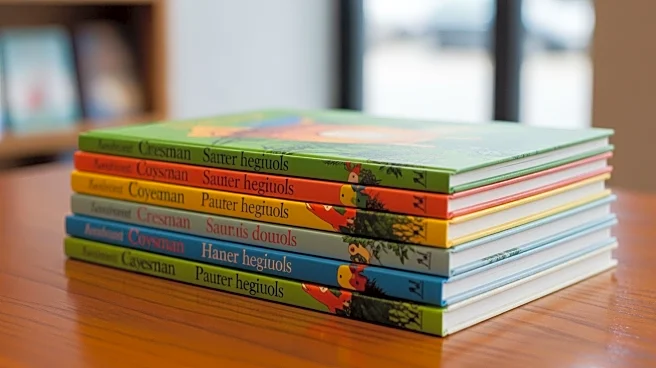What's Happening?
The 12th edition of the China Shanghai International Children’s Book Fair (CCBF) concluded its three-day event at the Shanghai World Expo Exhibition and Convention Centre on November 16. The fair, co-organized by Ronbo BolognaFiere Shanghai, featured
474 exhibitors, including 194 from overseas. Norway was highlighted as the guest of honor for the upcoming 2026 Bologna Children’s Book Fair. The event's first conference session focused on market data, revealing a 2.1% decline in the Chinese retail book market for the first 10 months of 2025 compared to the previous year. The children's book segment saw a slight decrease of 0.48%, yet it still accounted for 28.2% of the total market. Content-based platforms like WeChat and Weibo contributed to 47.6% of children's book sales, although growth in this channel has slowed. The fair also noted a decrease in heavy discounting practices, aiming to stabilize sales through higher prices.
Why It's Important?
The developments at the Shanghai Children’s Book Fair reflect significant shifts in the Chinese children's book market, impacting both domestic and international publishers. The decline in book output and sales indicates challenges in maintaining growth, especially as Chinese publishers focus on developing original titles and building intellectual property. This shift could lead to increased competition and innovation within the market, potentially affecting global publishing dynamics. The emphasis on higher pricing strategies suggests a move towards sustainable sales models, which could influence pricing structures in other markets. Additionally, the growing interest in social/emotional learning titles highlights changing consumer preferences, which may drive new trends in children's literature.
What's Next?
Looking ahead, the Chinese children's book market may experience more balanced rights buying and selling activities, as local publishers strengthen their production capabilities and seek to expand internationally. The next CCBF, scheduled for November 2026, will likely continue to explore these trends, offering opportunities for publishers to adapt to evolving market conditions. International publishers may need to focus on building relationships and conducting market research to navigate the changing landscape effectively. The emphasis on original content and intellectual property development could lead to new collaborations and partnerships between Chinese and overseas publishers.
Beyond the Headlines
The shift towards original content and intellectual property development in the Chinese children's book market may have broader cultural implications. As Chinese publishers create more homegrown titles, there could be an increase in cultural exchange and diversity in children's literature globally. This evolution may also influence the types of stories and themes that gain popularity, potentially leading to a richer and more varied literary landscape. Furthermore, the focus on social/emotional learning titles reflects a growing awareness of the importance of emotional intelligence and mental health in children's education, which could have long-term benefits for societal well-being.
















